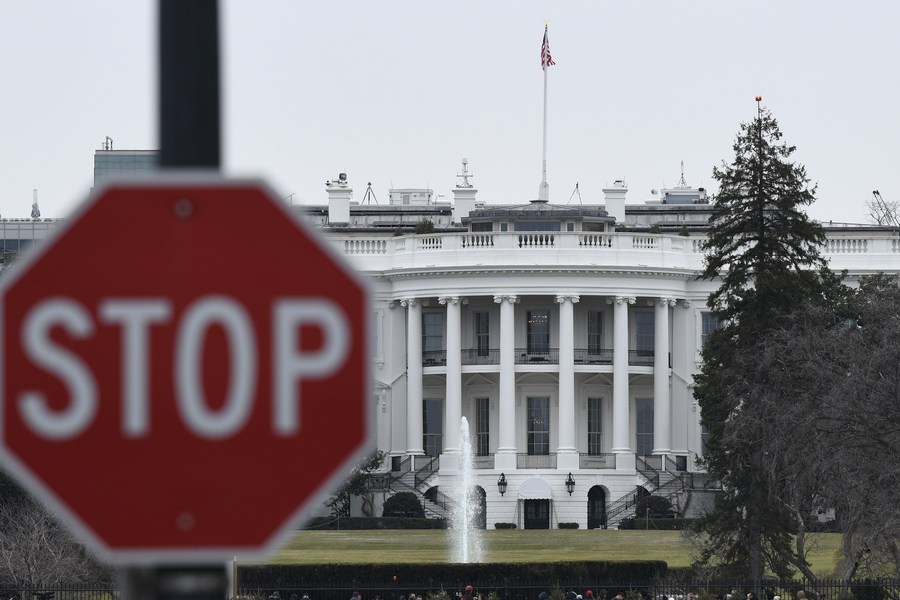
File photo shows the White House and a stop sign in Washington DC, the United States. [Photo/Xinhua]
By Zhao Kejin
US politicians have been blaming other countries and stakeholders for all the economic and social problems facing the United States, instead of making serious efforts to address them. The political act of passing the buck can be explained through what some call the "frustration-aggression" theory.
Passing the buck, or making another country or some ethnic group a scapegoat, has a long history in the US. For example, people of Chinese descent were made scapegoats for the smallpox epidemic, Russia was the scapegoat for the Cold War, and Muslims in general were blamed for the Sept 11, 2001, terrorist attacks and made the target of the "war on terror".
How to deal with the US politicians' buck-passing is a big diplomatic challenge for China.
As the world's only superpower, the US has declined to shoulder its responsibility as a global leader time and time again, and yet it has continued to pursue its selfish interests by creating trouble on the global stage.
To maintain the US' hegemony, its leaders are trying hard to contain China's rise, especially in the fields of trade, technology and global supply. By calling China a "political threat", the US politicians are trying to isolate China from the US-led international community. And they are smearing the Belt and Road Initiative and China's political system, by calling them threats to democracy and freedom across the world.
The US has also been stigmatizing China's foreign investments, technology promotion and people-to-people exchanges, claiming China has been using them as tools to "export its authoritarian model to the world".
In addition, the US now considers China as a strategic competitor, and describes China's growing military strength and Sino-US competition in technology as "security threats", while claiming that China's "lack of adherence to global trading norms has undercut the prosperity of Americans and others around the world".
The aim of buck-passing is to create imaginary enemies, so as to divert US citizens' attention from the administration's failure to address the serious issues at home. The trade war previous US president Donald Trump launched against China is an apt example of political buck-passing. As for incumbent President Joe Biden, he has largely followed Trump's trade policy toward China, albeit by toning down the rhetoric.
In fact, the Biden administration has chosen to win back old allies, strengthen the US' alliances and make China the scapegoat for the country's ills. For example, some US politicians have accused China of aggravating climate change by increasing carbon emissions, while the administration has been building the "Five Eyes" alliance (with the United Kingdom, Australia, Canada and New Zealand), the Quadrilateral Security Dialogue (with India, Japan and Australia), and AUKUS (with Australia and the UK), all in order to contain China's rise.
When China refused to buckle under the US' pressure, Washington claimed Beijing was practicing "Wolf Warrior diplomacy" and forced other countries to take sides between the world's two largest economies.
US hostility toward China became all the more obvious soon after the pandemic broke out, with some US politicians, without any evidence whatsoever, blaming China for the spread of the novel coronavirus. Since US officials didn't heed China's warnings to take proper and strict measures to contain the virus, the epidemic situation worsened rapidly in the US, and once that happened, they intensified their smear campaign against China.
The US' buck-passing policy has deteriorated China-US ties. The US considers a rising China as a threat to its global hegemony, so it uses every means possible to contain its rise and promote US-style democracy.
The US' blame game has also affected the global governance system. Some US politicians have taken advantage of rising populism in the country and sacrificed the US' long-term interests by urging their supporters to create scenarios that would distract public attention from the real domestic problems and contradictions. That in turn further polarized US society, intensified ethnic conflicts, affected social stability and threatened the global governance system.
The fact that the US follows a capitalist system makes it imperative that the country's political system primarily serve the capitalists. And thanks to the two-party system, US society and politics seem divided on bipartisan lines, which many politicians take advantage of to instigate the public to target China, so the two parties' leaders could hide their failures on multiple fronts, from healthcare and infrastructure to the economy and governance.
The author is a professor at the School of Social Sciences at Tsinghua University.

 中文
中文



